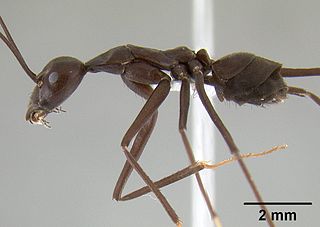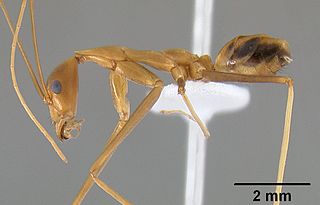
Leptomyrmex, or spider ants, is a genus of ants and a distinctive member of the ant subfamily Dolichoderinae. Commonly known as "spider ants" for their long legs and spider-like movements, these orange and black ants are prominent residents of intact wet forest and sclerophyll habitats throughout their range. One extant species, Leptomyrmex relictus, is known from central Brazil; otherwise, the global distribution of this genus is restricted to eastern Australia, New Caledonia and New Guinea, as well as the nearby Indonesian islands of Aru and Seram.
Leptomyrmex aitchisoni is a species of ant in the genus Leptomyrmex.
Leptomyrmex dolichoscapus is a species of ant in the genus Leptomyrmex.

Leptomyrmex darlingtoni is a species of ant in the genus Leptomyrmex. Described by William Morton Wheeler in 1934, the species is endemic to Australia.
Leptomyrmex cnemidatus is a species of ant in the genus Leptomyrmex. Described by William Morton Wheeler in 1915, the species is endemic to Australia.

Leptomyrmex erythrocephalus is a species of ant in the genus Leptomyrmex. Described by Johan Christian Fabricius in 1775, the species is endemic to Australia.

Leptomyrmex flavitarsus is a species of ant in the genus Leptomyrmex. Described by Smith in 1859, the species is endemic to Indonesia and New Guinea.

Leptomyrmex fragilis is a species of ant in the genus Leptomyrmex. Described by Smith in 1859, the species is endemic to Indonesia and New Guinea and the Philippines.
Leptomyrmex geniculatus is a species of ant in the genus Leptomyrmex. Described by Carlo Emery in 1914, the species is endemic to New Caledonia.
Leptomyrmex melanoticus is a species of ant in the genus Leptomyrmex. Described by William Morton Wheeler in 1934, the species is endemic to New Guinea.

Leptomyrmex mjobergi is a species of ant in the genus Leptomyrmex. Described by Auguste-Henri Forel in 1915, the species is endemic to Australia.
Leptomyrmex niger is a species of ant in the genus Leptomyrmex. Described by Carlo Emery in 1900, the species is endemic to New Guinea.
Leptomyrmex nigriceps is a species of ant in the genus Leptomyrmex. Described by Carlo Emery in 1914, the species is endemic to New Caledonia.

Leptomyrmex nigriventris is a species of ant in the genus Leptomyrmex. Described by Félix Édouard Guérin-Méneville in 1831, the species is endemic to Australia.

Leptomyrmex puberulus is a species of ant in the genus Leptomyrmex. Described by William Morton Wheeler in 1934, the species is endemic to New Guinea.
Leptomyrmex rothneyi is a species of ant in the genus Leptomyrmex. Described by Auguste-Henri Forel in 1902, the species is endemic to Australia.
Leptomyrmex rufipes is a species of ant in the genus Leptomyrmex. Described by Carlo Emery in 1895, the species is endemic to Australia.
Leptomyrmex rufithorax is a species of ant in the genus Leptomyrmex. Described by Auguste-Henri Forel in 1915, the species is endemic to Australia.

Leptomyrmex tibialis is a species of ant in the genus Leptomyrmex. First described by Carlo Emery in 1895 as Leptomyrmex nigriventris tibialis, the species is endemic to Australia, and found in both New South Wales and Queensland. The arguments for synonymy were made by Lucky and Ward, and the decision was accepted by the Australian Faunal Directory.

Leptomyrmex unicolor is a species of ant in the genus Leptomyrmex. Described by Carlo Emery in 1895, the species is endemic to Australia.








